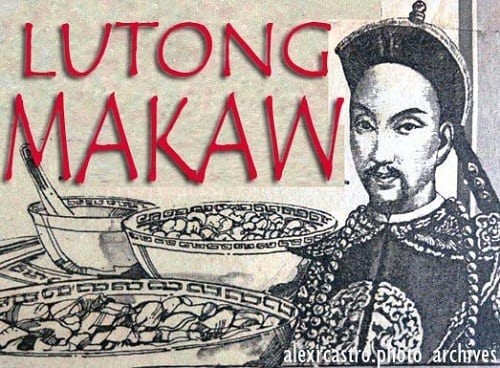– Fr Leonard E Dollentas
More recently, the Oxford English Dictionary added two more Filipino words into its list of some 1,400 Filipino words and phrases the dictionary had listed. Oxford included bongga, “which means extravagant, flamboyant, impressive, stylish or (more generally) excellent.” The other word is trapo, defined as “a politician perceived as belonging to a conventional and corrupt ruling class.” Trapo is short for “traditional politician,” which also refers to the Tagalog trapo , a word borrowed from Spanish which means rag – a word which aptly describes some politicians in the Philippines.
This makes me recall a Filipino expression connected with Macau. Though it has not yet reached the Oxford Dictionary, it similarly highlights the Philippines’ multiculturalism. The expression is “Lutong-Makaw” (“cooked Macau-style”). It is an expression that brings us back to the pre-war era, when life in the Philippines was tranquil and flourishing, and friendship with Chinese immigrants to the Philippines were deepening. This Filipino expression attests to some historical connections between Macau and the Philippines.
BACKGROUND
For some, this expression came about because Macau is the gaming capital of Asia. When there is a lot of gambling there is also a lot of swindlers, game fixers and double-dealers. In this context Lutong-Makaw would mean swindling connected with gaming – this origin of the word Lutong-Makaw is made up and has no accurate historical background.
I first heard the word when I was in high school back in the 80s. I did not recognize the word, not even the word Macau. It was used by our basketball coach during our summer inter-school basketball tournament. We wielded much effort to play fairly, but it was obvious the referee was favoring the other team. The members of the favored team were violent and almost hurled us all to the ground but never received any warning from the referee, while on our side just getting near with any of them would be considered foul. Our coach, who was dismayed with the outcome of the game, called the game Lutong-Makaw. I did not understand the connection between what went on with the game and the term Lutong-Makaw. I was confused with the word and I couldn’t get the drift. Later it became clear to me that the results were rigged. But still, I was clueless. How on earth did Macau get involved with this?
EMERGENCE OF THE EXPRESSION
The origin of Lutong Makaw might be traced to the 30s: “In the peacetime 30s, “Makaw” (derived from Macau), was an unofficial generic term used by Manilans for a Chinese immigrant, especially cooks. And they were very good cooks. Their culinary creations were called lutong makaw – cooked in Macau fashion. Macau Chinese were known for their practice of pre-arranging their ingredients well in advance, even before a dish was ordered.” (https://filipiknow.net/filipino-expressions-historical-origins/)
This way of advanced preparation was different from the way Filipinos prepare food. We want our ingredients straight from the sea, freshly harvested from the backyard garden or from the farm. This gave birth to the expression Lutong-Makaw.
The meaning of the expression Lutong-Makaw evolved and acquired the meaning of a rigged outcome. It has come to mean unscrupulous transactions and can apply to beauty contests, ballgames, business transactions, political events. Surprisingly, I even heard the word once from school children after receiving their grades from their teachers and comparing their markes with others.
RESTORING COURTESY
We are in a time when the profane, crude, and vulgar are very ordinary parts of our expressions. St Paul reminds us, “Let no corrupt communication proceed out of your mouth” (Ephesians 4:29).
The words we use in our conversations reflect the feelings of our heart and who we are. Our Christian faith tells us that clean and intelligent language is evidence of a lively and healthy mind. Good language that uplifts, encourages, and respects others complement to the blessings of having the Spirit always with us, as promised when we partake of the Holy Eucharist. It will depend on us—on how we act, what we do, and what we say. This applies not only with Lutong -Makaw , but to all profane language that we use. Our words show our good example. We will use our words not to profane or display rudeness but to show that we are followers of Jesus Christ, especially to others who are not Christians.


 Follow
Follow


